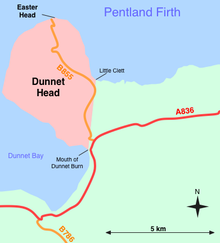Dunnet Head
Dunnet Head Ceann Dùnaid (Scottish Gaelic) | |
|---|---|
Headland | |
 Most northerly point of mainland Britain. | |
| Coordinates: 58°39′25″N 03°22′37″W / 58.65694°N 3.37694°W | |
| Grid position | ND 20206 75164 |
| Location | Highland, Scotland |
| Native name | Ceann Dùnaid (Scottish Gaelic) |
Dunnet Head (Scottish Gaelic: Ceann Dùnaid) is a headland in Highland, on the north coast of Scotland.[1][2] Dunnet Head includes the most northerly point of both mainland Scotland and the island of Great Britain.
Caithness is the historic county that Dunnet Head was within, the county town was Wick.[3]

Geography
The point, also known as Easter Head, is at grid reference ND202767, about 18 km (11 mi) west-northwest of John o' Groats and about 20 km (12 mi) from Duncansby Head. Dunnet Head can be seen also as the western limit of the Pentland Firth on the firth's southern, or Caithness, side (Duncansby Head is the eastern limit). Although Easter Head is the most northerly point on the Scottish mainland, the northernmost point of Scotland lies in the Shetland islands, approximately 170 miles (270 km) further north.

The headland's boundary with the rest of the Scottish mainland can be defined as a north–south line running from Little Clett (ND220740) to the mouth of Dunnet Burn (ND217709) in Dunnet Bay. This line is followed along most of its route by a single track road, the B855, which links Brough with the village of Dunnet, making this the most northerly road on mainland Britain. From this line, the headland projects westward and northward into the Atlantic Ocean and the Pentland Firth and shelters the more southerly waters of Dunnet Bay.
The peninsula is north-east of the burgh of Thurso, and on a clear day, it affords views of the islands of Stroma to the east, and Hoy and the Orkney Mainland, 15 km (9 miles) away to the north, across the Pentland Firth.
Military use
Near the Dunnet Head lighthouse are minor fortifications built during World War II to protect the naval base at Scapa Flow, including a Chain Home Low radar station and a bunker used by the Royal Observer Corps during the Cold War. Burifa Hill on Dunnet Head was the site of the master station and a monitoring station of the northern GEE chain of radio navigation stations during World War II. There was also an artillery range on Dunnet Head during World War II.
Angling
Dunnet Head lochs are restocked every two years with brown trout fry; fishing by permit is between 1 April and early October.
Bird watching
Dunnet Head has a viewing platform where visitors can watch birds in the neighbouring cliffs. Depending on the season, birds may include fulmars, guillemots, kittiwakes, puffins, great skuas, arctic skuas, razorbills, and - at sea - gannets and herring gulls.[4]
Geodesy
Dunnet Head was the central meridian of the 6-inch (150-millimetre) and 1:2500 Ordnance Survey maps of Caithness.[5]
Ptolemaic Record
Dunnet Head is recorded as Virvedrum in Ptolemy's 2nd-century Geography.[6]
See also
Scotland mainland points
- Dunnet Head - Scotland's most northerly point on the mainland
- Mull of Galloway - Scotland's most southerly point on the mainland
- Corrachadh Mòr - Scotland's most westerly point on the mainland
- Keith Inch - Scotland's most easterly point on the mainland
Great Britain mainland points
- Dunnet Head - most northerly point on the island of Great Britain
- Lizard Point - most southerly point on the island of Great Britain
- Ness Point - most easterly point on the island of Great Britain
- Corrachadh Mòr - most westerly point on the island of Great Britain
Other
- List of extreme points of the United Kingdom
- List of lighthouses in Scotland
- List of Northern Lighthouse Board lighthouses
References
- ^ Ordnance Survey: Landranger map sheet 12 Thurso & Wick (John O’Groats) (Map). Ordnance Survey. 2014. ISBN 9780319226124.
- ^ "Ordnance Survey: 1:50,000 Scale Gazetteer" (csv (download)). www.ordnancesurvey.co.uk. Ordnance Survey. 1 January 2016. Retrieved 18 February 2016.
- ^ "Caithness | Northern Scotland, History, Dunnet Head | Britannica". www.britannica.com. 28 May 2024.
- ^ "Dunnet Head Nature Reserve, Caithness, Highland, Scotland". The RSPB. Retrieved 1 November 2019.
- ^ Geodesy Archived 26 October 2016 at the Wayback Machine, charlesclosesociety.org. Accessed 16 October 2022.
- ^ Marx, Cristian. "Rectification of position data of Scotland in Ptolemy's Geographike Hyphegesis". Researchgate. Researchgate. Retrieved 9 May 2024.
External links
- Map sources for Dunnet Head

